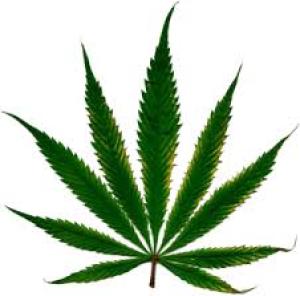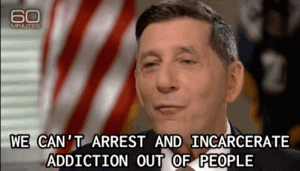A National Town Hall recently took up the question of how Black Lives Matter fits in with drug reform.
The US Solicitor General urges the Supreme Court to brush off a lawusit by Nebraska and Colorado seeking to invalidate Colorado's marijuana legalization law.
Dire predictions that relaxing the marijuana laws would lead to an increase in teen pot smoking have not been borne out.
The specter of state regulation is prompting California cities and counties to regulate or ban medical marijuana activities, including several more this week; Florida's already delayed medical marijuana program faces more delays, Chicago sees its first dispensary, and more.
A sticky-fingered Ohio cop heads for prison, so does a gun-smuggling Miami cop, an Indiana cop gets busted peddling dope, and more.
It looks like we're now down to one serious legalization initiative in California, calls grow for a safe injection site in New York City, Nepalese villagers fight marijuana eradicators, and more.
It's one of those all-marijuana news days. A Vermont legalization bill looms, Dallas could stop arresting small-time pot possessors, a Michigan medical marijuana hearing got testy, and more.
Legal weed is drawing tourists to Colorado, DC activists fight for pot clubs, a federal appeals court rules that all students at a technical college can be subjected to drug testing, there's naloxone news from New York City and North Carolina, and more.
A legalization initiative dies in Florida, but another is born in Montana; the Justice Department proposes funding increases for asset forfeiture programs, Mexico issues the first permits allowing people to grow and possess marijuana, and more.
San Francisco prepares for marijuana legalization, a Kentucky state senator wants it there too, Ohio legalizers spent millions losing last month, a federal drug and mental health treatment bill passes the Senate, and more.
The New York Times discovers public pot smoking in its backyard, another Florida jurisdiction decriminalizes, Florida's medical marijuana program faces more delays, the drug czar calls the drug war a failure, and more.
Cpngress continues to block DEA harassment in medical marijuana states, Washington state could see a lot more pot shops, it looks like Florida will vote again on medical marijuana, Ireland is moving toward setting up a supervised injection site in Dublin, and more.
This article was published in collaboration with AlterNet and first appeared here.
The Black Lives Matter movement sprung out of the unjust killings of young black men (Trayvon Martin, Eric Garner, Michael Brown), either at the hands of self-styled vigilantes or police. But as the movement blossomed and matured, BLM began turning its attention to a broader critique of the institutional racism behind police violence against the black population.

While the war on drugs plays a central role in generating conflict between the black community and law enforcement, the critique of institutional racism in policing and the criminal justice system necessarily implicates the nation's drug policies. The grim statistics of racially biased drug law enforcement are well-known: blacks make up about 13% of the population, but 30% of all drug arrests; blacks account for nearly 90% of all federal crack cocaine prosecutions; black federal crack offenders were sentenced to far more prison time that white powder cocaine offenders; blacks and other minorities are disproportionately targeted in traffic stop and stop-and-frisks despite being less likely than whites to be carrying drugs, and so on.
People who have been spent careers working in the drug reform movement didn't need the publication of Michelle Alexander's The New Jim Crow to understand the corrosive and screamingly unfair impact of drug war racism on black communities, but the 2010 broadside helped open eyes outside the movement and deepened the visceral impact of drug war racism for those already in the trenches. The book continues to reverberate. And now, Black Lives Matter is bringing a whole new sense of energy and urgency to the issue.
Despite efforts by leading drug reform groups like the Drug Policy Alliance, the world of drug reform remains overwhelmingly white. With marijuana legalization proceeding at a rapid pace and business opportunities emerging, the unbearable whiteness of the marijuana industry is becoming an increasingly high-profile issue.
Last month, Black Lives Matter activists released Campaign Zero, a comprehensive platform for curbing police violence and reforming the criminal justice system in the US. The platform does not explicitly call for ending the war on drugs, but drug war policies and policing techniques are inextricably intertwined with the policing problems (and solutions) it identifies. Campaign Zero calls for decriminalizing marijuana within the context of a broader call for moving away from "broken windows" policing, as well as demanding an end to mass stop-and-frisk and racial profiling policies, both impelled in large part by the drug war. It also calls for an end to "policing for profit," whether through issuing tickets for revenue-raising purposes or through another drug war creation, the use of civil asset forfeiture to seize cash and goods from people without convicting them of a crime (sometimes without even arresting them).
Most of the other Campaign Zero policy proposals regarding police use of force, militarization and community control don't directly address the war on drugs, but because the drug war is so pervasive, it is implicated with them as well. According to the FBI, drug offenses were the single largest category of arrests made, constituting 1.5 million of the 11 million arrests nationwide last year.
How does a mostly white drug reform movement that is already intellectually aware of drug war racism, and that has used it to its advantage in efforts like the Washington, DC marijuana legalization fight and the struggle to roll back harsh mandatory minimum drug sentencing laws, deal with Black Lives Matter? To its credit, the Drug Policy Alliance took a big whack at it during last month's International Drug Policy Reform Conference in suburban Washington. While race and the drug war were an issue at numerous sessions during the conference, a Live National Town Hall on "Connecting the Dots: Where the Drug Policy Reform Movement and the #BlackLivesMatter Intersect" brought a laser-like focus to the topic. And it was a hot topic -- event organizers had to move the event to a larger room at the last minute when it became evident that hundreds of people were determined to be there.
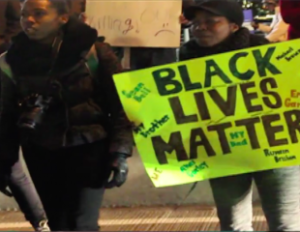
They came to hear from a panel that included BLM co-founder Patrice Cullors, Break the Chains: Communities of Color and the War on Drugs founder and executive director Deborah Peterson-Small, NAACP Legal Defense Fund senior organizer Lumumba Bandele, DPA policy manager Kassandra Frederique, and St. Louis hip-hop artist T-Dubb-O. DPA program director Asha Bandele was the moderator.
People have to open their minds to new paradigms, the panelists warned. "People are so wedded to the institution of policing they can't even imagine something different, something radical," said Cullors. "We have to transform the way our communities have been completely devastated by the war on drugs."
"We are at a historic moment right now, a moment where freedom looks different to people than how it looked before," said Peterson-Small. "Harriet Tubman famously said she could have freed more slaves if the people only knew they were slaves -- that's the psychology of enslavement. What we need now is a conversation about white people who believe they're free when they're not," she said.
"We black people already know we're not free," Small continued. "I worry about the people who believe they're free, the people who think the police are your friends, that they're here to serve and protect you. You have a lot of illusions about the role of police in your lives."
The legacy of slavery lives on all too vividly in the modern criminal justice system, she said.
"Policing is the way white America continues to replicate the cycle of enslavement, the power dynamic on which this society is based. Every time a black man is arrested, it's a reenactment of that dynamic," Peterson-Small said.
"We believe in two incompatible things," she told the audience. "We believe that we live in a free and democratic country where anyone who works hard can succeed, but we also know we live in a country established by and for the benefit of white men. White folks are in denial about that incompatibility, but it's no longer possible to pretend something that's been going on for 200 years hasn't been happening."
Removing the blinders from white people's eyes is part of the struggle, she said. "Our fight for freedom is your fight for freedom. Oppressed people have to be the agent and catalyst of freedom for their oppressors," she told a rapt crowd.
DPA's Frederique talked about the imperative she felt to make the connection between her work as a drug reformer and the broader issue of racism in America in the wake of the Trayvon Martin killing.
"We can't wait to make the connection, I needed to understand how to make the connection," she said, "but I was without words. Now, I locate the work I do as racial justice. If we're going to continue to say that the war on drugs is war on people of color, if we continue to get nontraditional allies and say marijuana legalization is a civil rights issue and how we are winning, I find it hard to believe the idea that we can win the war on drugs without winning the war on people of color. If we think that, we're doing something wrong."
"Drug policy reform needs to systematically disrupt and destroy institutional racism," she said. "If we don't, we can't ask black people to sit at the table."
But as moderator Asha Bandele noted, it's not just white racism that's holding down black people when it comes to drug policy. "Respectable" black people have been a bulwark of the drug war, too. If you just obey the law, you won't get in trouble, they say, looking down their noses at their troublesome brethren.
That's wrongheaded, said Peterson-Small. "If we were having this conversation 135 years ago, people would have said the same thing about the pig laws as we say now about the crack laws," she said. "We've always been in a war for our survival in this country. The only reason we are here is to be a source of economic profit for other people."
Alluding to Poland's WWII-era Lodz Ghetto, Peterson-Small warned that meekly complying with harsh and arbitrary authority to ensure the survival of the community can end up with the elimination of the community.
"We've got to stop drinking that Kool-Aid," she said. "When we as a community are willing to stand up for the brother with a blunt and a 40 the way we did with Trayvon, they won't be able to keep us down."
"Just look at me," said hip-hop attired T-Dubb-O. "I have a dream, too. I don't want to be a hashtag, I don't want to sell drugs, to kill somebody who looks like me. It's the system of white supremacy that puts me in that mind state. When you talk about the war on drugs, that school-to-prison pipeline, that's what gives them that mind-state," he said.
"We don't own no poppy farms, but now we have a heroin epidemic," he said. "The murders you see in Chicago, those killings in St. Louis, that's heroin."
T-Dubb-O took drug war solidarity to the next level, mentioning the case of the 43 missing Mexican student teachers presumably killed by drug gangs working in cahoots with corrupt local politicians.
"We have to have an international vision of the people who are repressed," he said.
In response to an audience question, Peterson-Small got down to nuts and bolts. If we want to dismantle racism, drug policy provides a space to apply harm reduction to the problem.
"The work that really needs to be done is for people to understand that we're not the ones who need fixing," she said. "All of us have been infected by this thing. If we apply harm-reduction principles, we would focus on what is the intervention, not who is the racist. It's a course of treatment, not a weekend of racial sensitivity training."
The National Town Hall is just a beginning. We still have a long way to go.
back to top
In a brief filed Wednesday, the US Solicitor General urged the Supreme Court to dismiss a lawsuit by the states of Nebraska and Oklahoma against Colorado's marijuana legalization law.

Will they agree with the Solicitor General?
Nebraska and Oklahoma argued that Colorado's voter-approved system of taxed and regulated marijuana commerce conflicts with the Controlled Substances Act and thus violates the Constitution's supremacy clause.
They seek an injunction invalidating the sections of the Colorado legalization law that regulate legal marijuana commerce.
But in its brief urging the high court to dismiss the lawsuit, the Solicitor General argues that the Supreme Court is not the proper venue for the case because Nebraska and Oklahoma show no direct injury by the state of Colorado (as opposed to third parties acting criminally) and it is thus not a proper case of original jurisdiction.
The proper jurisdiction, the Solicitor General suggested, was federal district court.
The state of Colorado is fighting the lawsuit, and the Solicitor General's brief largely followed the arguments of the state in its briefs.
Drug reformers applauded the action.
"We are pleased the DOJ agrees that this lawsuit borders on the frivolous. States have historically been allowed to establish their own criminal laws," said Jolene Forman, staff attorney for the Drug Policy Alliance. "Moreover, Colorado is putting resources into ensuring its policies follow DOJ guidelines and has worked extensively with the DOJ towards this goal."
The federal government itself has not challenged the regulatory law in Colorado, nor did they choose to interfere with its implementation. To the contrary, the government has deprioritized enforcement of state-level marijuana reforms and acknowledged the interests that both states and the Federal government have in openly regulating marijuana.
"Nebraska and Oklahoma's primary problems are their own punitive policies regarding marijuana use and possession," said Art Way, Colorado State Director of the Drug Policy Alliance. "It is not Colorado's fault these states look to spend such a high degree of law enforcement and judicial resources on marijuana prohibition. Nebraska and Oklahoma should look to establish policies based on the potential harm of marijuana as opposed to simply using marijuana as the gateway to their criminal justice systems."
"This is the right move by the Obama administration," said Tom Angell, chairman of Marijuana Majority. "Colorado and a growing number of states have decided to move away from decades of failed prohibition laws, and so far things seem to be working out as planned. Legalization generates tax revenue, creates jobs and takes the market out of the hands of drug cartels and gangs. New federal data released this week shows that as more legalization laws come online, we're not seeing an increase in teen marijuana use, despite our opponents' scare tactics," he continued.
back to top
The article was written in collaboration with AlterNet and first appeared here.
The University of Michigan's annual Monitoring the Future (MTF) survey of teen drug use was released today and shows that softening attitudes toward marijuana and actual marijuana legalization in four states and Washington, DC, have not translated into increased teen pot smoking.
The survey also had generally good news about other drugs, reported declines in teen use of ecstasy, heroin, alcohol, cigarettes, and synthetic cannabinoids.
MTF has been tracking drug use, including alcohol and tobacco, since 1975, and surveys more than 40,000 8th, 10th, and 12th graders in some 400 public and private secondary schools across the country. The research is sponsored by the National Institutes on Drug Abuse.
"Marijuana, the most widely used of the illicit drugs, did not show any significant change in annual prevalence this year in any of the three grades, nor in the three grades combined," MTF reported in its press release. "After rising for several years, the annual prevalence of marijuana has more or less leveled out since about 2010."
That's significant since legalization wasn't approved in Colorado and Washington until November 2012 and in Alaska, Oregon, and Washington, DC, in November 2014. And in each case, it took some time to actually go into effect.
If legalization in the states has had any effect on teen pot use rates, the MTF figures make clear it hasn't shown up yet. Teen pot use stabilized before legalization and hasn't increased since.
While use rates have been stable for the last five years, with 12% of 8th graders, 25% of 10th graders, and 35% of seniors reporting using at least once in the past year, they are well above the historic lows that MTF reported in the early 1990s (although near the levels of the survey's earliest years in the 1970s, which, interestingly, are omitted from the tables accompanying this year's report).
The report also found that a tiny fraction of teens are using marijuana regularly. These rates stand at 1.1%, 3.0% and 6.0% in 8th, 10th and 12th grades, respectively. These rates are also higher than the historic lows from the early 1990s.
The stabilization of teen marijuana use comes even as MTF reports that the percentage of students who see its use as carrying a great risk has declined dramatically. Fewer than a third (32%) of seniors saw a great risk, down from 58% in 2005, and similar decreases obtained for 8th and 10th graders.
And it comes even as teen support for legalization grows. A June 2014 MTF report noted that, "The proportion of 12th-grade students who favor legalization of marijuana was at the highest level ever recorded" and, "The proportion of 12th-grade students who favor marijuana use as a crime is at the lowest level ever recorded by the survey."
Students for Sensible Drug Policy was quick to make the obvious point.
"Youth marijuana use is stable, and even falling in some categories, all while a growing number of states enact legalization," said Betty Aldworth, the group's executive director. "This new data solidifies early indications that the scare tactics peddled by prohibitionists are false. Criminalization isn't the way to encourage young people to make healthy choices; regulating a legal market and honest, reality-based education is."
"That fact is made even more clear by the continued reduction in youth tobacco and alcohol use. We didn't need to put anyone in handcuffs or jail cells to convince an historic number of students to avoid smoking and drinking. These reductions were achieved with honest, evidence-based public health strategies and not by criminalizing cigarettes or beer. Drug use is a health matter and should be treated that way," Aldworth concluded.
back to top
The specter of state regulation is prompting California cities and counties to regulate or ban medical marijuana activities, including several more this week; Florida's already delayed medical marijuana program faces more delays, Chicago sees its first dispensary, and more.
NationalOn Tuesday, Congress agreed to continue blocking DEA interference with medical marijuana states. Lawmakers have extended a ban on funding for the DEA and Justice Department to go after medical marijuana in states where it is legal. They also extended protections for hemp research, but failed to include provisions that would have allowed pot businesses to use the financial system and would have allowed Veterans Administration doctors to recommend medical marijuana.
California
On Monday, the Dana Point city council voted unanimously to ban cultivation, sales and deliveries. The move comes as the county seeks to maintain regulatory authority by acting before March 1, when the California Medical Marijuana Regulation and Safety Act shifts control to the state if localities have not acted.
On Tuesday, Contra Costa County supervisors unanimously supported a cultivation and delivery ban for unincorporated areas of the county. Supervisors said it was to maintain local control ahead of the new medical marijuana law, but local activists say they don't trust local officials to regulate -- instead of ban -- such activities.
Also on Tuesday, Ventura County supervisors voted unanimously to formalize bans on commercial cultivation and sales ahead of the new state law. All 10 cities in the county also have similar bans, and the cities that don't have formal bans are working to enact them.
Florida
As of Monday, the state is being challenged over its medical marijuana grower licensing scheme. Eleven companies are challenging the way the state issued licenses for the nascent industry. The challenges will be heard by the Florida Division of Administrative Hearings. This means another round of court proceedings and further delays in getting medicine to patients. The program is already a year behind schedule, and now the earliest that medicines could be available is next spring or summer.
On Tuesday, the medical marijuana initiative campaign had 900,000 signatures. The United for Care initiative campaign says it already has 900,000 signatures, but is aiming for more than one million. These are raw signatures. The initiative will need 683,149 valid voter signatures to qualify for the 2016 ballot. A similar initiative won 58% of the vote last year, but failed because, as a constitutional amendment, it needed 60% to pass.
Georgia
Last Friday, the state's medical marijuana commission rejected in-state growing. The Commission on Medical Cannabis voted 9-5 against allowing medical marijuana to be grown in the state, but the main proponent of expanding the program, Rep. Allen Peake (R-Macon) said he was still optimistic he can get in-state cultivation approved. "I think we can still make a compelling argument to the governor," Peake said. "I think we can address the fears of law enforcement. I think we can address the issue of potential demand. I'm absolutely certain we can provide legislation that both maximizes the benefit for our citizens and minimizes the risk to public health in our state."
On Monday a new poll found strong support for medical marijuana. Under current Georgia law, people with certain illnesses are allowed to use medical marijuana, but it can't be grown or produced in the state. A new poll has 84.5% of respondents supporting expanding that law to allow for in-state cultivation with strict regulation. Rep. Allen Peake (R-Macon) has sponsored legislation that would do just that.
Illinois
Last Wednesday, the first dispensary in the Second City opened for businesss. Chicago's first medical marijuana dispensary opened in Uptown. Dispensary 33 opened on North Clark Street. Some 150 patients are registered to use it.
Last Friday, the state told patients they couldn't be gun owners, then retreated. Illinois state police sent letters to a handful of patients saying their firearms cards were being revoked, but now say the letters were sent in error. Patients remain skeptical.
On Wednesday,
the state said it will allow residents to petition to add more qualifying conditions. State residents hoping to add a new disease or medical condition to the state's list of qualifying conditions will be able to do so during the month of January, state health officials said Wednesday. They can submit
petitions to the state Department of Public Health through January 31.
Michigan
Last Tuesday, there were fireworks at a Senate medical marijuana hearing. A hearing on a package of bills to regulate dispensaries grew heated as Marine Corp veteran Dakota Serna, who uses medical marijuana for PTSD, lashed out at changes in the bill that would tax patients and send some of the revenues to law enforcement. "This bill not only takes more money from them, it taxes their medicine -- you're going to give some of that medicine to the sheriff's department, the jackboots, the thugs that comes into people's homes and kick in the door," said Serna. That led to an angry exchange with Senate Judiciary Committee Chair Rick Jones (R-Grand Ledge), who then ordered Serna to leave the hearing. The National Patients' Rights Association, which had supported the bill, said it is withdrawing its support after the changes, which would treat medical marijuana much like the state treats alcohol.
Last Thursday, activists managed to kill those dispensary bills Sen. Rick Jones (R-Grand Ledge) has given up on moving his medical marijuana dispensary bills in the face of strong opposition by activists. The link has all the juicy details.
Missouri
Last Thursday,a medical marijuana initiative was approved for circulation. Secretary of State Jason Kander (D) has approved a medical marijuana initiative for signature-gathering. Read the initiative here.
Utah
On Monday, a new poll had strong support for medical marijuana. Some 61% of Utahns support legalizing medical marijuana, according to a new poll from Dan Jones and Associates. The poll comes as Sen. Mark Madsen (R-Saratoga Springs) says he will reintroduce a medical marijuana in the coming session. His bill last session failed by one vote in the Senate.
[For extensive information about the medical marijuana debate, presented in a neutral format, visit MedicalMarijuana.ProCon.org.]
back to top
A sticky-fingered Ohio cop heads for prison, so does a gun-smuggling Miami cop, an Indiana cop gets busted peddling dope, and more.
In Anderson, Indiana, an Anderson police officer was arrested last Thursday after he allegedly sold drugs to an undercover FBI agent. Donald Jordan, 52, went down after a tipster told the FBI Jordan had offered to sell him marijuana. The FBI then sent an undercover agent to seek Xanax and hydrocodone from him and succeeded in scoring. He was then arrested. It's not clear what the precise federal charges are, but he's looking at up to 15 years in prison.In Chicago, a former Cook County jail guard pleaded guilty December 5 to smuggling marijuana, alcohol, and tobacco into the jail. Jason Marek, 30, copped to one count of federal program bribery, which carries a maximum 10-year sentence. He smuggled the contraband into the jail inside sandwiches. He had agreed to smuggle in the pot and booze for an inmate after the inmate paid him $200 for used (!) chewing tobacco.
In Newark, New Jersey, a former Miami-Dade police lieutenant was sentenced last Wednesday to 10 years in federal prison for teaming up with cocaine smugglers to smuggle guns through airport security. Ralph Mata had been an internal affairs lieutenant, one of the agency's most sensitive jobs. He admitted buying six guns for an established cocaine smuggling ring, smuggling them through checkpoints at Miami International Airport, and onto planes bound for the Dominican Republic. He was a 23-year veteran of the force.
In Cleveland, a former Warrensville Heights police officer was sentenced Monday to three years in prison for stealing drugs and some $41,000 in cash from the department. Andre Harmon, 54, must also pay $10,000 in fines and $41,000 in restitution. He pleaded guilty last month to drug possession, theft in office and tampering with records. He was responsible for destroying seized drugs, but instead took them home and filed false affidavits that he had destroyed them.
back to top
It looks like we're now down to one serious legalization initiative in California, calls grow for a safe injection site in New York City, Nepalese villagers fight marijuana eradicators, and more.
Marijuana PolicyCalifornia "Sean Parker Initiative" Revised. The Adult Use of Marijuana Act (AUMA), backed by billionaire tech titan Sean Parker, has been revised to add safeguards for protecting children, maintaining local government control over pot commerce, shielding small businesses from monopolistic competition, and strengthening worker and labor protections in the industry, the campaign said Monday. Click on the title link for more details on the changes.
ReformCA Activists Migrate to Parker Initiative. The California Coalition for Cannabis Policy Reform (ReformCA) has apparently given up on getting its own legalization initiative on the ballot, with a majority of ReformCA board members now endorsing the Adult Use of Marijuana Act, known more widely as the "Sean Parker initiative." Board members endorsing the Parker initiative include Oaksterdam University founder Richard Lee, Law Enforcement Against Prohibition head Neill Franklin, Students for Sensible Drug Policy deputy director Stacia Cosner, California Cannabis Industry Association director Nate Bradley, and Dr. Bronner's Magic Soaps head David Bronner; and two other board members have reportedly agreed to withdrawing the ReformCA initiative, making a majority. "We have carefully reviewed amendments submitted by the proponents of the Adult Use of Marijuana Act, and we're convinced it's time to endorse that initiative and unite everyone behind a single, consensus measure to achieve a legal, regulated system, which a majority of voters have consistently said they want," Bronner said in a prepared statement.
Harm Reduction
Advocates Call for New York City Supervised Injection Site. Faced with a fourth straight year of increasing heroin overdose deaths, public health advocates are calling on the New York City to do more on overdose prevention, including authorizing supervised injection sites. "It's time for New York City to follow the science," said Julie Netherland, PhD, of the Drug Policy Alliance. "Supervised injection facilities can reduce overdose deaths and have proven effective in improving a host of public health and public safety outcomes. We can no longer afford to let fear and stigma stand in the way of saving lives."
International
Slovenia Joins Ranks of Countries Allowing Supervised Injection Facilities. The local nonprofit Stigma has launched a supervised injection site pilot project in the capital, Ljublana. Stigma and the Slovenian Ministry of Health worked quietly behind the scenes to get legal approvals and funding before going public.
Nepalese Villagers Clash With Marijuana Eradicators. Marijuana growing villagers in Makawanpur District fought with police trying to eradicate their crops Monday. Gunfire came from both sides, but no injuries were reported, and crowds dispersed after the gunfire. Police said they had destroyed about 20 acres worth of marijuana crops.
back to top
It's one of those all-marijuana news days. A Vermont legalization bill looms, Dallas could stop arresting small-time pot possessors, a Michigan medical marijuana hearing got testy, and more.
Marijuana PolicyVermont Legalization Bill Coming Soon. The Senate Government Operations Committee is finishing up deliberations on a bill to legalize marijuana. Lawmakers are putting final touches on the bill and expect it to be done in time to go to the printer Friday. This bill and another legalization bill offered during the last legislative by Sen. David Zuckerman (P/D-Chittenden) will be taken up first by the Senate Judiciary Committee.
Dallas Could Move to Ticketing, Not Arresting, People for Pot Possession. Dallas's police chief has asked the city council to consider a "cite and release" policy for small-time marijuana possession busts. The council's Public Safety Committee voted Tuesday not to recommend the policy change, but the issue will go before the entire council shortly, though no date has been set. The policy change would apply to possession of less than four ounces. Dallas police arrest about 120 a month for small-time pot possession, and the chief says it's a waste of law enforcement resources to have to book and jail them.
Medical Marijuana
Fireworks at Michigan Senate Medical Marijuana Hearing. A hearing on a bill to provide protections for dispensaries grew heated Tuesday as Marine Corp veteran Dakota Serna, who uses medical marijuana for PTSD, lashed out at changes in the bill that would tax patients and send some of the revenues to law enforcement. "This bill not only takes more money from them, it taxes their medicine -- you're going to give some of that medicine to the sheriff's department, the jackboots, the thugs that comes into people's homes and kick in the door," said Serna. That led to an angry exchange with Senate Judiciary Committee Chair Rick Jones (R-Grand Ledge), who then ordered Serna to leave the hearing. The National Patients' Rights Association, which had supported the bill, said it is withdrawing its support after the changes, which would treat medical marijuana much like the state treats alcohol.
First Dispensary in the Second City is Now Open for Business. Chicago's first medical marijuana dispensary opened in Uptown today. Dispensary 33 opened on North Clark Street. Some 150 patients are registered to use it.
International
Health Canada Approves Cannabis Oil Sales. Health Canada has granted permission to Peace Naturals to sell cannabis oil under the country's federal medical marijuana program. Health Canada had decided this past summer to allow the manufacture of cannabis oils, but this is the first time a product has actually been approved.
Uruguay Grants First Two Licenses for Commercial Marijuana Production, Distribution. The country has granted licenses to two companies that will allow them to sell marijuana through government-licensed pharmacies next year. Each company will be allowed to grow up to two tons of finished buds.
back to top
Legal weed is drawing tourists to Colorado, DC activists fight for pot clubs, a federal appeals court rules that all students at a technical college can be subjected to drug testing, there's naloxone news from New York City and North Carolina, and more.
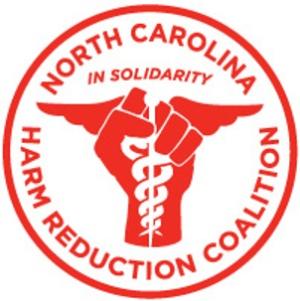
NCHRC reports 1,500 overdoses prevented with Naloxone in 2 1/2 years.
Legal Marijuana is Boosting Colorado Tourism. Pot businesses have long claimed as much, and now they have some solid evidence. A Colorado Tourism Office study released Wednesday shows that the state's marijuana laws influenced nearly half (49%) of decisions to vacation in the state. Some 22% of survey respondents said marijuana was "extremely influential" in their decision to visit Colorado. Twenty percent said it was "very much influential" and nearly 7% said it was "somewhat influential."
DC Activists Fight Back Against Bill That Would Ban Pot Clubs. The city council is today hearing a bill that would make permanent a ban on businesses allowing patrons to smoke marijuana on premises, but that's not sitting well with the people who got weed legalized in the District. "It's unnecessary. The current law prohibits any venue from selling marijuana or promising marijuana in exchange for admission. But what they're doing with this bill is banning any kind of use of use outside the home. There's a big problem with that, because there are lots of people who have nowhere to use their cannabis," said Adam Eidinger, the man behind the District's successful 2014 legalization initiative. Eidinger is warning that if the council passes the bill, he could push more ballot initiatives, including one allowing marijuana to be treated like tobacco and one that would impose term limits on council members.
Illinois Lawmaker Files Decriminalization Bill. Rep. Kelly Cassidy (D-Chicago) announced today that she is filing House Bill 4357, which would make possession of up to 10 grams a civil offense punishable only by a fine. A similar bill passed earlier this year only to be vetoed by Gov. Bruce Rauner (R), who proposed amendments to it at the time of his veto. The new bill addresses those amendments.
Michigan Legalization Campaign to Extend Signature Gathering. MI Legalize is extending its signature gathering campaign and turning to paid circulators to qualify for next year's general election ballot. Under state law, petitioners have 180 days to gather signatures, but that is a clock that runs backward from the time signatures are actually turned in. The campaign's original turn-in date was December 21, but it will now go longer. That means early gathered signatures may not be counted. For example, if the campaign turned in signatures on January 21 instead of December 21, the first 30 days' worth of signatures would not be counted, but more recent signatures would.
Medical Marijuana
Georgia Medical Marijuana Commission Rejects Growing It In-State. The Commission on Medical Cannabis voted 9-5 against allowing medical marijuana to be grown in the state, but the main proponent of expanding the program, Rep. Allen Peake (R-Macon) said he was still optimistic he can get in-state cultivation approved. "I think we can still make a compelling argument to the governor," Peake said. "I think we can address the fears of law enforcement. I think we can address the issue of potential demand. I'm absolutely certain we can provide legislation that both maximizes the benefit for our citizens and minimizes the risk to public health in our state."
Missouri Medical Marijuana Initiative Approved for Circulation. Secretary of State Jason Kander (D) has approved a medical marijuana initiative for signature-gathering. Read the initiative here.
Drug Testing
Federal Appeals Court Rules Missouri College Can Drug Test All Students. The 8th US Circuit Court of Appeals in St. Louis ruled Monday that the Linn State Technical College can require all students to take drug tests. The appeals court decision overturns a federal judge's 2013 decision that the college could only drug test students in five particularly safety-sensitive programs. The school policy had been challenged by the ACLU of Missouri, which said such widespread, suspicionless drug testing violated the Fourth Amendment.
Harm Reduction
New York City Makes Overdose Reversal Drug Naloxone Available Without a Prescription. Mayor Bill de Blasio (D) announced Monday that the opioid overdose reversal drug naloxone (Narcan) will now be available without a prescription in pharmacies in the city. "The deaths are what we all struggle to avoid… but that's just the tip of the iceberg," de Blasio said during his announcement at a YMCA. "For every death, there are literally hundreds who struggle with addiction."
North Carolina Sees 1,500 Lives Saved With Overdose Reversal Drug Naloxone. In just under 2 ½ years, more than 1,500 overdose deaths have been prevented with the use of the overdose reversal drug naloxone (Narcan), the North Carolina Harm Reduction Coalition reported today.
Law Enforcement
Rep. Steven Cohen Rips Use of Student Snitches. In the wake of a 60 Minutes report last Sunday and earlier reporting by Reason, Rep. Steve Cohen (D-TN) ripped into the practice of using nonviolent, first-time drug offenders as confidential informants. "It's time for the Department of Justice to take a close look at how the behavior of confidential informants not only threatens to ruin young lives, but in some cases, end their lives," he said, adding that he intends to file reform legislation.
International
Scotland To Begin Ticketing, Not Prosecuting, People With Pot. Starting next month, Scottish police will issue warnings to people caught with marijuana rather than prosecuting them. The move is part of a broader effort to change how police deal with petty crime, freeing them up to deal with more serious offenses.
back to top
A legalization initiative dies in Florida, but another is born in Montana; the Justice Department proposes funding increases for asset forfeiture programs, Mexico issues the first permits allowing people to grow and possess marijuana, and more.

!Viva Mexico!
Florida Legalization Initiative Gives Up. Marijuana legalization will not be on the Florida ballot next year. Regulate Florida, which was the group behind the campaign, conceded Wednesday that it would not be able to gather the 683,000 needed signatures by the February deadline. They may try again in 2018, the group said.
Montana Legalization Initiative Approved for Signature Gathering. Secretary of State Linda McCulloch (D) Thursday approved the language of Initiative 178, which would legalize pot for people 21 and over, subject to licensing requirements and state regulations. Petitioners need 24,175 valid voter signatures, including at least 5% of registered voters in each of the state's 343 House districts.
St. Petersburg Ponders Decriminalization. St. Petersburg city council members Thursday asked Pinellas County commissioners to decriminalize small-time pot possession. Council members said that if the county doesn't act, they will draft their own municipal decriminalization proposal. In the past year, local decriminalization has taken off in Florida, with Miami-Dade, Broward, and Palm Beach counties, as well as several municipalities in those counties, adopting similar ordinances.
Asset Forfeiture
Justice Department Wants Even More Money for Asset Forfeiture Programs. American law enforcement is seizing property from citizens at a record rate, but that's apparently not good enough for the Justice Department, which is seeking increased funding to support the asset forfeiture activities of the DEA and the Organized Crime Drug Enforcement Task Forces. The department wants $297.2 million to fund asset forfeiture in FY 2016, up $14 million over the previous year and up a whopping 146% since 2008. The entire federal drug control budget has increased by only 25% during that same period.
Drug Policy
Maine Legislature Caves in to Governor, Agrees to Hire More Drug Agents. Legislative leaders Wednesday unveiled a $4.8 million plan to fight the state's opiate use problem, with half of the funding going to law enforcement, including the hiring of 10 new state drug agents. Gov. Paul Le Page (R) had threatened to call in the National Guard today to fight drugs if the legislature didn't fund his demands. The other half of the money designated would go toward treatment, recovery, and education.
International
Mexico Issues First Permits to Grow and Use Marijuana. The Mexican government has awarded permits to four people that allow them to grow and possess marijuana for personal use. The move comes in the wake of last month's Supreme Court decision allowing the four to legally produce it for their own use. Both the court ruling and the permits were limited to the four people in the case, but could pave the way for similar court rulings across the country and, ultimately, pot legalization nationwide.
Danish Parliament Considers Medical Marijuana. The parliament today began debating a proposal to legalize marijuana for medical use. The bill is sponsored by Alternativet, but has the support of other parties as well. Alternativet, Dansk Folkeparti, Liberal Alliance, Socialistisk Folkeparti, and Radikale all support the bill. Together, they have 88 votes in parliament, precisely the number needed for the measure to pass.
back to top
San Francisco prepares for marijuana legalization, a Kentucky state senator wants it there too, Ohio legalizers spent millions losing last month, a federal drug and mental health treatment bill passes the Senate, and more.
Marijuana PolicyJeb Bush Now Supports Decriminalization, But Still Calls Pot a "Gateway Drug." GOP presidential contender Jeb Bush last Friday said he could live with decriminalization. "It's one thing to say we should have decriminalization of marijuana. I support that," he said in an interview with Joe Mathieu of Boston' WBZ NewsRadio. While that is an advance for the former Florida governor, he added that he rejected legalization and brought out the discredited gateway theory for support. "Marijuana is a gateway drug just as opiates are a gateway drug," Bush continued. "Of course it is, every study shows that."
Kentucky Senator Files Marijuana Legalization Bill. Sen. Perry Clark (D-Louisville) announced last Friday that he has pre-filed the Cannabis Freedom Act, which would repeal pot prohibition and replace it with a regulatory framework that would "promote public safety and responsible cannabis consumption by persons over 21 years of age." The bill will be considered during the 2016 legislative session, which starts January 5.
Michigan Supreme Court Okays Grand Rapids Decriminalization Ordinance. The state high court has rejected a challenge to the ordinance's legality from Kent County Prosecutor William Forsyth. The ordinance, approved by voters in 2012, makes possession or sharing marijuana a civil infraction, punishable only by fines. Forsyth had argued that the ordinance was an illegal restriction on his power to enforce state drug laws, but he lost in circuit court and the Court of Appeals. And he lost again, and finally, when the state Supreme Court refused to hear his appeal.
Ohio Legalizers Spent Nearly $22 Million in Failed Initiative Campaign. Ouch, that's gotta hurt! ResponsibleOhio and its deep-pocketed backers, who hoped to win monopolistic marijuana concessions, spent more than $21 million in their campaign, only to get trounced last month. The campaign spent $12 million between July and October and had burned through nearly another $10 million just getting on the ballot.
Eyeing Looming Legalization, San Francisco Creates Marijuana Task Force. Last week, the Board of Supervisors' Rules Committee voted to appoint 11 people to a task force aimed at helping to guide the city's policies in the face of seemingly inevitable marijuana legalization.
Medical Marijuana
Michigan Medical Marijuana Activists Stop Dispensary Bills. Sen. Rick Jones (R-Grand Ledge) has given up on moving his medical marijuana dispensary bills in the face of strong opposition by activists. The link has all the juicy details.
Utah Poll Has Strong Support for Medical Marijuana. Some 61% of Utahns support legalizing medical marijuana, according to a new poll from Dan Jones and Associates. The poll comes as Sen. Mark Madsen (R-Saratoga Springs) says he will reintroduce a medical marijuana in the coming session. His bill last session failed by one vote in the Senate.
Heroin
New Hampshire Attorney General Will Seek Murder Charges in Heroin Overdoses. Attorney General Joe Foster (D) says he plans to aggressively seek murder charges against dealers of drugs involved in overdose deaths. "The message to dealers is: If you sell this stuff here and we can (figure) the facts out, you will be going to jail for a very, very long time," Attorney General Joe Foster said. Overdose deaths are expected to top 400 in the state this. Foster also said he is seeking $115,000 for a new prosecutor for drug cases and exploring a federal grant to hire another drug prosecutor.
Drug Policy
Federal Synthetic Drugs Bill Filed. Rep. John Katko (R-NY) has filed HR 4229, which seeks to "address the continued threat posed by dangerous synthetic drugs by amending the Controlled Substance Act" to make it easier to go after drug analogs. It also calls on the US Sentencing Commission to ensure that sentences for violations are "appropriately severe."
Drug Treatment
Comprehensive Justice and Mental Health Act Passes Senate. The act, S 993, sponsored by Sen. Al Franken (D-MN), passed the Senate last Thursday. It is aimed at facilitating collaboration among the criminal justice, juvenile justice, veterans treatment services, mental health treatment, and substance abuse systems. The bill now goes to the House.
International
Colombian Senate Approves Medical Marijuana. In a plenary session last Friday, the Colombian Senate approved a bill legalizing medical marijuana. President Santos had said he would do it through an executive order, but the Senate decided not to wait. The bill now moves to the Chamber of Deputies, where it will be debated early next year.
(This article was prepared by StoptheDrugWar.org's lobbying arm, the Drug Reform Coordination Network, which also pays the cost of maintaining this web site. DRCNet Foundation takes no positions on candidates for public office, in compliance with section 501(c)(3) of the Internal Revenue Code, and does not pay for reporting that could be interpreted or misinterpreted as doing so.)
back to top
The New York Times discovers public pot smoking in its backyard, another Florida jurisdiction decriminalizes, Florida's medical marijuana program faces more delays, the drug czar calls the drug war a failure, and more.
Marijuana PolicyNew Yorkers Are Smoking Pot on the Streets! The New York Times rather breathlessly reports it has discovered that "lighting up and strolling around seems increasingly common in pockets of Brooklyn, on side streets in Manhattan and in other public spaces." The newspaper cites street smokers are saying they are emboldened by legalization elsewhere in the country and by the low-key comments of the city's leaders, including the police commissioner. Public pot smoking remains an arrestable offense, but that doesn't appear to be stopping a lot of people, especially white people. White people make up less than 9% of those arrested for pot possession.
Florida's Palm Beach County Decriminalizes. County commissioners voted this morning to decriminalize the possession of 20 grams or less of marijuana. Officers can still arrest possessors, but now have the option of simply issuing them a $100 ticket instead. Miami-Dade County has already decriminalized, and so have several municipalities in the Greater Miami area.
Medical Marijuana
Florida Challenged Over Medical Marijuana Grower Licensing. Eleven companies are challenging the way the state issued licenses for the nascent industry. The challenges will be heard by the Florida Division of Administrative Hearings. This means another round of court proceedings and further delays in getting medicine to patients. The program is already a year behind schedule, and now the earliest that medicines could be available is next spring or summer.
Drug Policy
Drug Czar Calls Drug War a Failure, But Resists Calls to Legalize Marijuana. Office of National Drug Control Policy (ONDCP -- the drug czar's office) head Michael Botticelli proclaimed the war on drugs a failure during a CBS "60 Minutes" interview. He said the "failed policies and failed practices" of the past were largely responsible for the country's mass incarceration problem. "It has been all wrong," he said. "We can't arrest and incarcerate addiction out of people. Not only do I think it's really inhumane, but it's ineffective, and it cost us billions upon billions of dollars to keep doing this." But he couldn't wrap his head around marijuana legalization, arguing that legal drugs kill half a million people a year and that legalizing would send the wrong message."So, we know that about one in nine people who use marijuana become addicted to marijuana. It's been associated with poor academic performance, in exacerbating mental health conditions linked to lower IQ," he said, adding that he fears states becoming co-dependent on "tax revenue that's often based on bad public health policy."
International
Ireland Proposes Drugged Driving Law That Could See "Completely Sober" Drivers Arrested. Transport Minister Paschal Donohoe is backing proposed drugged driving legislation that would allow for roadside drug testing of drivers and prosecution of drivers who had even inactive metabolites of drugs such as marijuana in their systems. When asked if the bill could lead to the prosecution of "completely sober" drivers, Donohoe replied, "yes." Under more questioning, he denied that prosecuting drivers who were not impaired but who had marijuana metabolites in their systems was a case of the government prosecuting drug offenses. "No, it's a road safety offense," he said.
back to top
Congress continues to block DEA harassment in medical marijuana states, Washington state could see a lot more pot shops, it looks like Florida will vote again on medical marijuana, Ireland is moving toward setting up a supervised injection site in Dublin, and more.
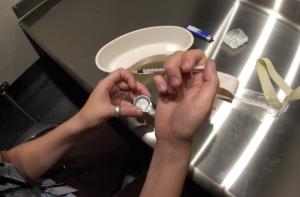
A supervised injection site is coming to Dublin next year. (vch.ca)
Congress to Continue Blocking DEA Interference With Medical Marijuana States. Lawmakers have extended a ban on funding for the DEA and Justice Department to go after medical marijuana in states where it is legal. They also extended protections for hemp research, but failed to include provisions that would have allowed pot businesses to use the financial system and would have allowed Veterans Administration doctors to recommend medical marijuana.
Washington Could Allow Lots More Marijuana Stores. The Washington State Liquor and Cannabis Board (WSLCB) today heard a staff recommendation to increase the number of retail marijuana outlets from 334 to 556. The move is expected to be finalized in emergency rules to be announced January 6.
Medical Marijuana
Florida Medical Marijuana Initiative Already Has 900,000 Signatures. The United for Care initiative campaign says it already has 900,000 signatures, but is aiming for more than one million. These are raw signatures. The initiative will need 683,149 valid voter signatures to qualify for the 2016 ballot. A similar initiative won 58% of the vote last year, but failed because, as a constitutional amendment, it needed 60% to pass.
Illinois to Consider Adding New Qualifying Conditions. State residents hoping to add a new disease or medical condition to the state's list of qualifying conditions will be able to do so during the month of January, state health officials said Wednesday. They can submit petitions to the state Department of Public Health through January 31.
Methamphetamine
Indiana Legislators Compete Over How to Restrict Access to Cold Medications. Faced with a bill that would require a doctor's prescription to obtain cold medications containing pseudoephedrine, two lawmakers have come up with an alternative measure that would instead allow pharmacists to decide whether or not customers could buy the cold medications.
Drug Treatment
Most People in Treatment for Marijuana Are Sent There By Courts. A report this month from the US Department of Health and Human Services finds that between 2003 and 2013 52% of people in drug treatment for marijuana were referred by the criminal justice system. Only 18% were in treatment because they sought it themselves.
International
Irish Cabinet Approves Supervised Injection Site in Dublin. The cabinet has approved a pilot plan for a medically supervised injection facility in the nation's capital. The move came yesterday and was at the behest of Aodhan O'Riordain, the minister in charge of the National Drug Strategy. The country's drug law must first be amended to allow for such facilities, which should happen early next year.
back to top








